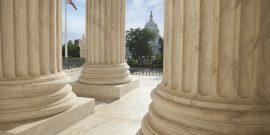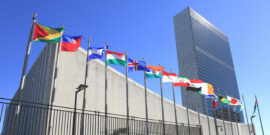Republicanism, not democracy, might be a structural principle we can use to guide our interpretation of the Constitution.
How Self-Invented Rights Undermine the Common Good
On December 22, as New York’s LaGuardia Airport was filled with holiday travelers, Tommy Dorfman, an actor who played a gay male on the Netflix teen drama “Thirteen Reasons Why” but then “came out” as a transgender female in 2021, held up the Delta line as “she” denounced an airplane employee for having intentionally “misgendered” her. The employee did so, according to Dorfman, a “transgender activist,” by referring to Dorfman with a male pronoun (even though the employee did refer to Dorfman twice with female pronouns). While the confused employee denied having made the ”error” intentionally, he had to call airport police to talk to Dorfman to end the incident. However, Delta officials promised to investigate the incident, after viewing the TikTok video that Dorfman made of it.
Dorfman’s confrontation with the Delta employee exemplifies the problem that Philip K. Howard addresses in Everyday Freedom: the disposition of many Americans to insist that others respect their (often self-invented) “rights,” in a way that undermines the capacity of our institutions, public and private, to address the country’s needs. Companies like Delta have to bend over backward to avoid offending someone, lest they risk not only alienating some bloc of customers, but also being found liable for substantial legal damages. The adoption of an ever-growing list of government regulations and corporate rules to avoid such risks, Howard argues, undermines individual initiative. And the habit of regarding anyone one has to deal with professionally (coworkers, employees, bosses, students, customers) as a potential accuser undermines the sense of social trust that social scientists like Edward Banfield and Francis Fukuyama have demonstrated is the precondition of a healthy polity.
Howard is a lawyer and chair of Common Good, a nonpartisan organization “aimed at replacing red tape with human responsibility.” He is the author of six previous books directed at that goal, the best-known of which is the first, The Death of Common Sense. But whereas Howard’s earlier works were directed at promoting “simplified structures that allow government to accomplish its goal without stifling Americans’ freedom, his newest, short but powerful, volume focuses on what he now sees as “the greater danger,” which “is not ineffective government, but the corrosion of American culture.”
Howard attributes what he views as the “alienation” of Americans from their country—their “no longer believ[ing]” in it—to the emergence of the “nondiscrimination” regime (my term, not his) starting in the 1960s, which remade the country’s “social and legal institutions … to try to eliminate unfair choices by people in positions of responsibility.” The resultant legal structures “reflected a deep distrust of human authority in even its more benign forms,” such as “a teacher’s authority in the classroom, or a manager’s judgment about who’s doing the job, or a university president’s authority to enforce norms of civil discourse.” The result, as documented in Howard’s previous books, was the replacement of individual responsibility with just “going by the book,” along with the “repression” of “spontaneity” in the workplace and “free speech on campus.”
Howard is a Tocquevillean. He astutely cites Tocqueville’s observation that “it is especially dangerous to enslave men in the minor details of life” through centralized, bureaucratic supervision, since repression—all in the name of the spirit of equality and efficiency—“enervates” men’s character, to the point that they are hardly fitted to exercise their judgment and will in matters of greater political moment. Like Harvard political scientist Robert Putnam (author of Bowling Alone), he shares Tocqueville’s admiration for the administrative decentralization that he observed in American life when he visited in 1831-32, along with our practice of the “art of association,” through which Americans organized themselves in voluntary civic, charitable, and religious groups. In America, Tocqueville observed, citizens would undertake public projects—on their own—that in France would have been left to the central government. Howard adds the worry that present-day Americans’ loss of respect for rigid, overbearing institutions has led to a rise in selfishness (or what Tocqueville called, in a negative sense, “individualism”).
Rigid rules imposed by public employee unions have made it practically impossible to dismiss incompetent or unmotivated workers for anything short of violent crime.
Since, as John Locke taught, the goal of a properly constructed legal system is to enlarge and protect people’s (legitimate) freedom, not reduce it, lawgivers need to balance the benefits of particular policies and projects against the risk that a small number of individuals may be harmed in minor ways. When the capacity of schools to discipline misbehaving students is hampered by the threat of lawsuits, for instance, the result is that the right of the large majority of students to learn is obstructed through continued disruptions. A Public Agenda survey that Howard cites found that 78 percent of teachers reported having been accused by students of violating their “rights.”
Turning to the other side, rigid rules imposed by public employee unions (the theme of Howard’s previous book, Not Accountable) have made it practically impossible to dismiss incompetent or unmotivated workers for anything short of violent crime. Even worse, and not uncommon, are instances like one Howard cites in which social workers are unable to rescue endangered young children from the homes of drug-addled parents because of statutory limits.
Another of Howard’s noteworthy recommendations for institutional reform is setting reasonable boundaries to the role of juries in civil trials, as learned jurists like Oliver Wendell Holmes and Benjamin Cardozo recommended. While the Seventh Amendment guarantees jury trials in civil cases, these judges argued that the role of a jury is to decide matters of fact (like a witness’s veracity, or who ran a red light) rather than standards of conduct (such as negligence). The rights revolution of the 1960s, Howard observes, resulted in a “feeding frenzy” for trial lawyers, generating not only absurdly high-dollar settlements and exaggerated claims of “pain and suffering,” but also idiotic precautions that business enterprises must now undertake. Often, as in most of the asbestos liability cases, manufacturers settle despite the absence of evidence of harm. Then there was the plaintiff who sought $54 million in damages from a dry cleaner for losing a pair of pants. (Though the cleaner won the case, its litigation costs compelled it to close one of its two stores.)
I do, however, have three question marks or corrections regarding Howard’s argument. First, in objecting to Harvard “philosopher” John Rawls’s contention that individual rights should not be “subject to the calculus of social interests,” Howard fails to distinguish between the limited class of natural rights (“negative” ones) which the Founders made the very purpose of our government to secure, along with ancillary legislation (such as the 1964 Civil Rights Act and 1965 Voting Rights Act) designed to effectuate those rights, and limitless “rights” invented by judges, politicians, and academics (such as the right to a paid vacation authorized by the United Nations Declaration of Human Rights) which, when they aren’t simply meaningless, enable interested minorities to undermine the will of the people, as expressed by their elected representatives.
Second, having some experience with the educational sector, I believe Howard errs in accepting the line that “evaluating teachers by test scores transforms schools into drill sheds, without joy or curiosity.” I fear he is unaware of the abuses and negligence that tenured public school teachers, whose work is not assessed in this way, have frequently perpetrated against their pupils. While standardized tests have their limitations, they hardly prevent motivated teachers from including innovative, challenging material of their own into their lessons.
Finally, the problem with the rights revolution isn’t that it prevents public officials from making “value judgments,” as Howard maintains. They indeed need to engage in cost-benefit analysis more frequently than they do, so that needed public and private projects aren’t blocked by a minority of activists unable to win at the polls but who instead use the judiciary to have their way. But that isn’t what is normally meant by a value judgment (this is good, that’s bad). To be clearer, Howard should have stressed that officials’ evaluations need to be grounded in facts.
But these reservations aside, Everyday Freedoms is a fine, well-thought-out book that I recommend to all public-minded citizens. It is a valuable addition to Philip Howard’s wide-ranging work on behalf of the public good.



